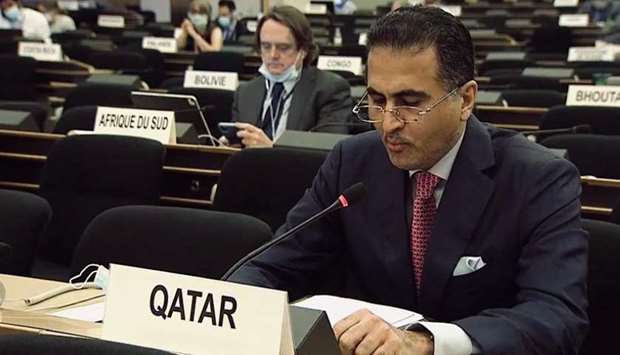Qatar reaffirmed yesterday that the unjust blockade and unilateral coercive measures imposed on the State, which entered its fourth year, caused numerous human rights violations documented in detail by the technical mission of the Office of the High Commissioner for Human Rights (OHCHR) and many international human rights organisations.
Qatar stressed that given the persistence of these numerous violations as well as the absence of a solution in the near future, it hopes that the OHCHR will inform the State of the steps it intends to take in order to stop the violations, hold those responsible accountable and prevent their recurrence.
This came in a speech delivered by HE Qatar's Permanent Representative to the UN Office in Geneva ambassador Ali bin Khalfan al-Mansouri during the interactive dialogue on the annual report by the OHCHR and oral update on the coronavirus (Covid-19) epidemic.
He said that the coronavirus pandemic that swept the world represents a great challenge for all, stressing that all precautionary measures must be aimed at protecting public health. He emphasised the need to strengthen international solidarity and respect for human rights in the response and recovery stages after the crisis.
He stressed that Qatar has been keen to provide free tests and healthcare services to everyone who lives on its land. He added that an Amiri gesture pardoning 500 prisoners was made with their health and humanitarian conditions in mind, noting that great efforts were made to protect migrant workers during the coronavirus crisis as employers were obliged to pay wages, and a service to receive labor complaints was launched.
The ambassador pointed out that at the international level, despite the illegal blockade imposed on Qatar and the closure of airspace, land and sea by the blockading countries, the State and its institutions have responded to the calls to confront the effects of this pandemic and provided various types of medical and logistical support to many countries.
He indicated that Qatar supports many health organisations and institutions working to develop vaccines and ensure the resilience of health care in other countries, pointing out that a contribution of $140mn has been made to these organisations.
The ambassador thanked the OHCHR on its statement to the council at this session. (QNA)
This came in a speech delivered by HE Qatar's Permanent Representative to the UN Office in Geneva ambassador Ali bin Khalfan al-Mansouri during the interactive dialogue on the annual report by the OHCHR and oral update on the coronavirus (Covid-19) epidemic.
He said that the coronavirus pandemic that swept the world represents a great challenge for all, stressing that all precautionary measures must be aimed at protecting public health. He emphasised the need to strengthen international solidarity and respect for human rights in the response and recovery stages after the crisis.
He stressed that Qatar has been keen to provide free tests and healthcare services to everyone who lives on its land. He added that an Amiri gesture pardoning 500 prisoners was made with their health and humanitarian conditions in mind, noting that great efforts were made to protect migrant workers during the coronavirus crisis as employers were obliged to pay wages, and a service to receive labor complaints was launched.
The ambassador pointed out that at the international level, despite the illegal blockade imposed on Qatar and the closure of airspace, land and sea by the blockading countries, the State and its institutions have responded to the calls to confront the effects of this pandemic and provided various types of medical and logistical support to many countries.
He indicated that Qatar supports many health organisations and institutions working to develop vaccines and ensure the resilience of health care in other countries, pointing out that a contribution of $140mn has been made to these organisations.
The ambassador thanked the OHCHR on its statement to the council at this session. (QNA)

